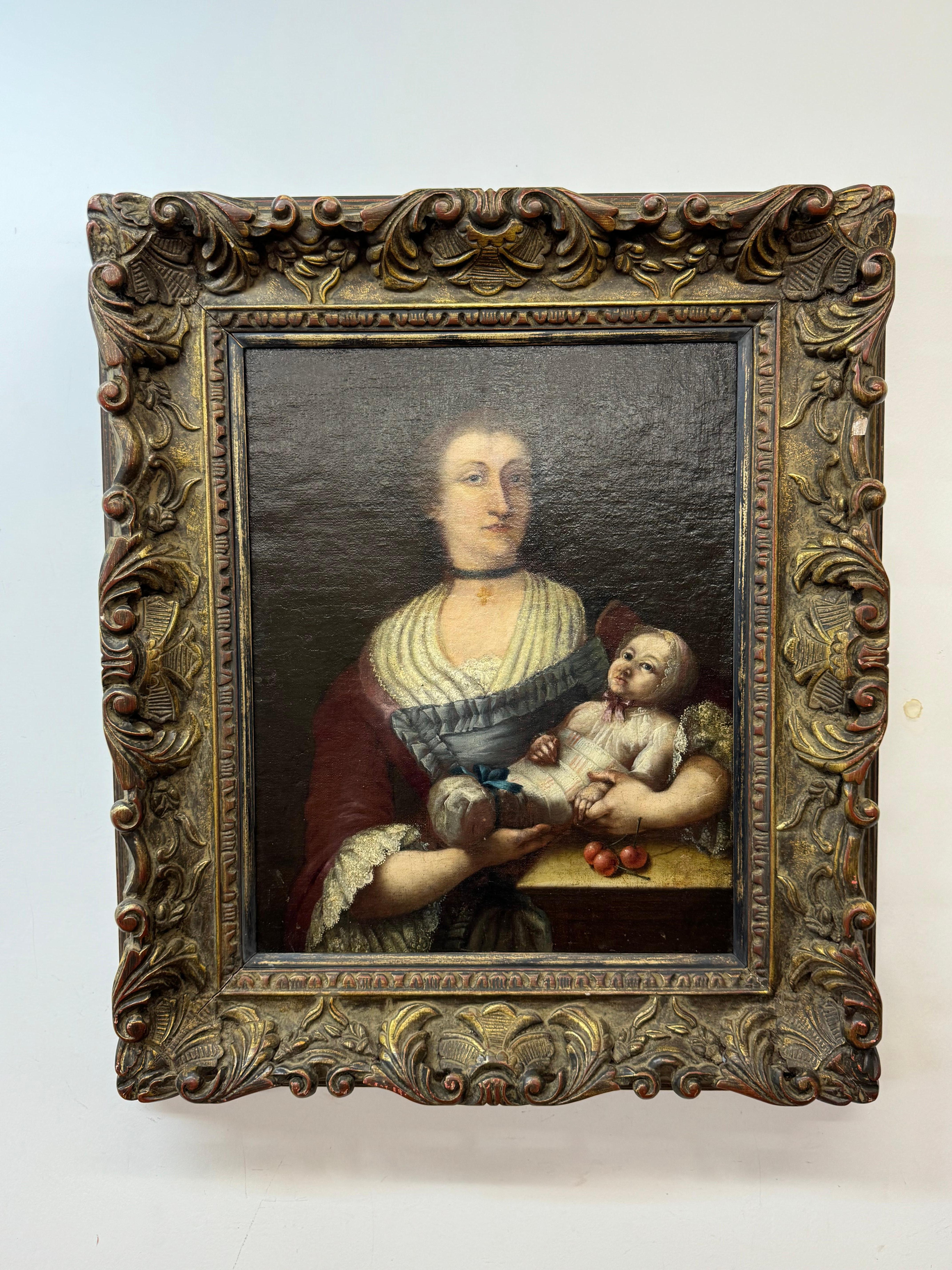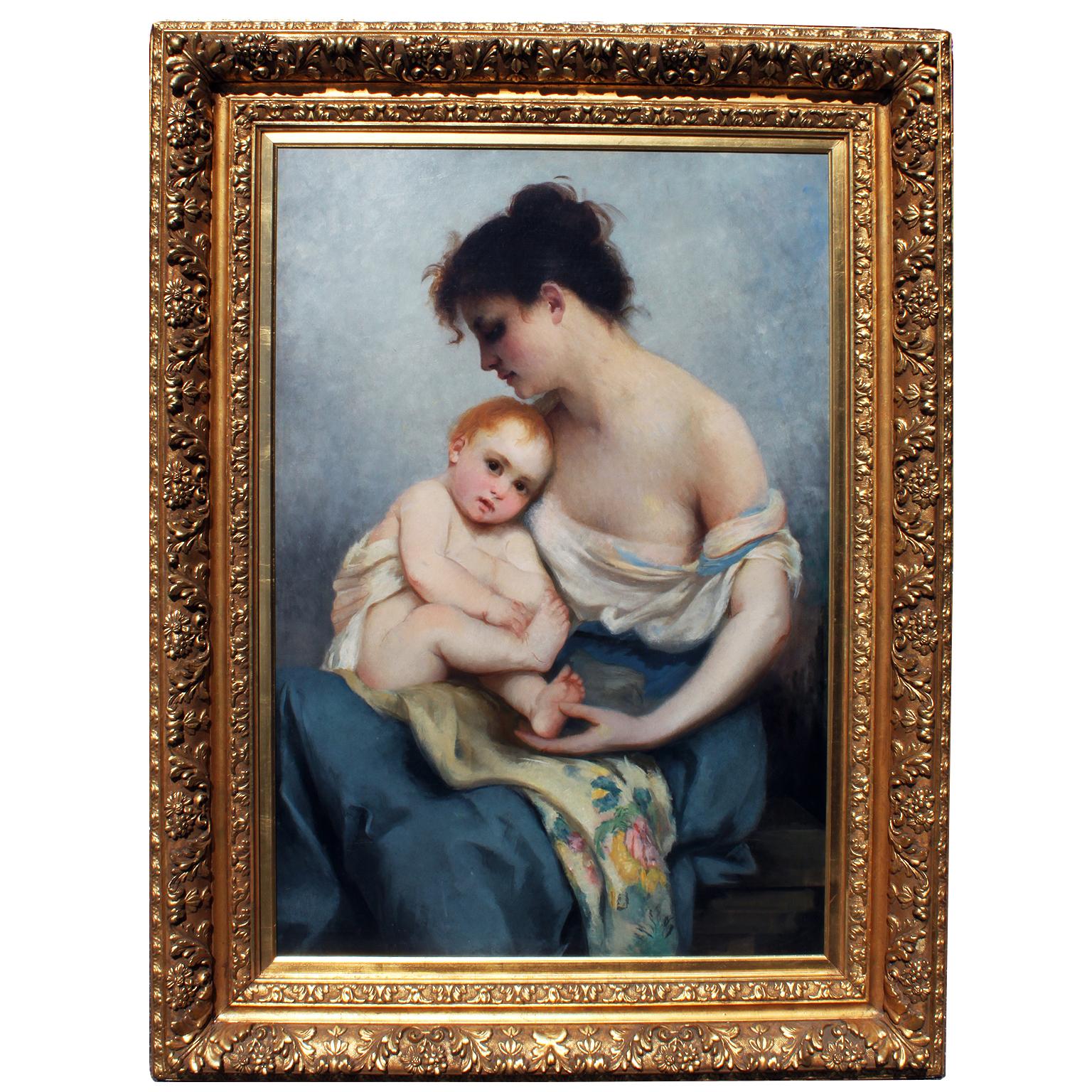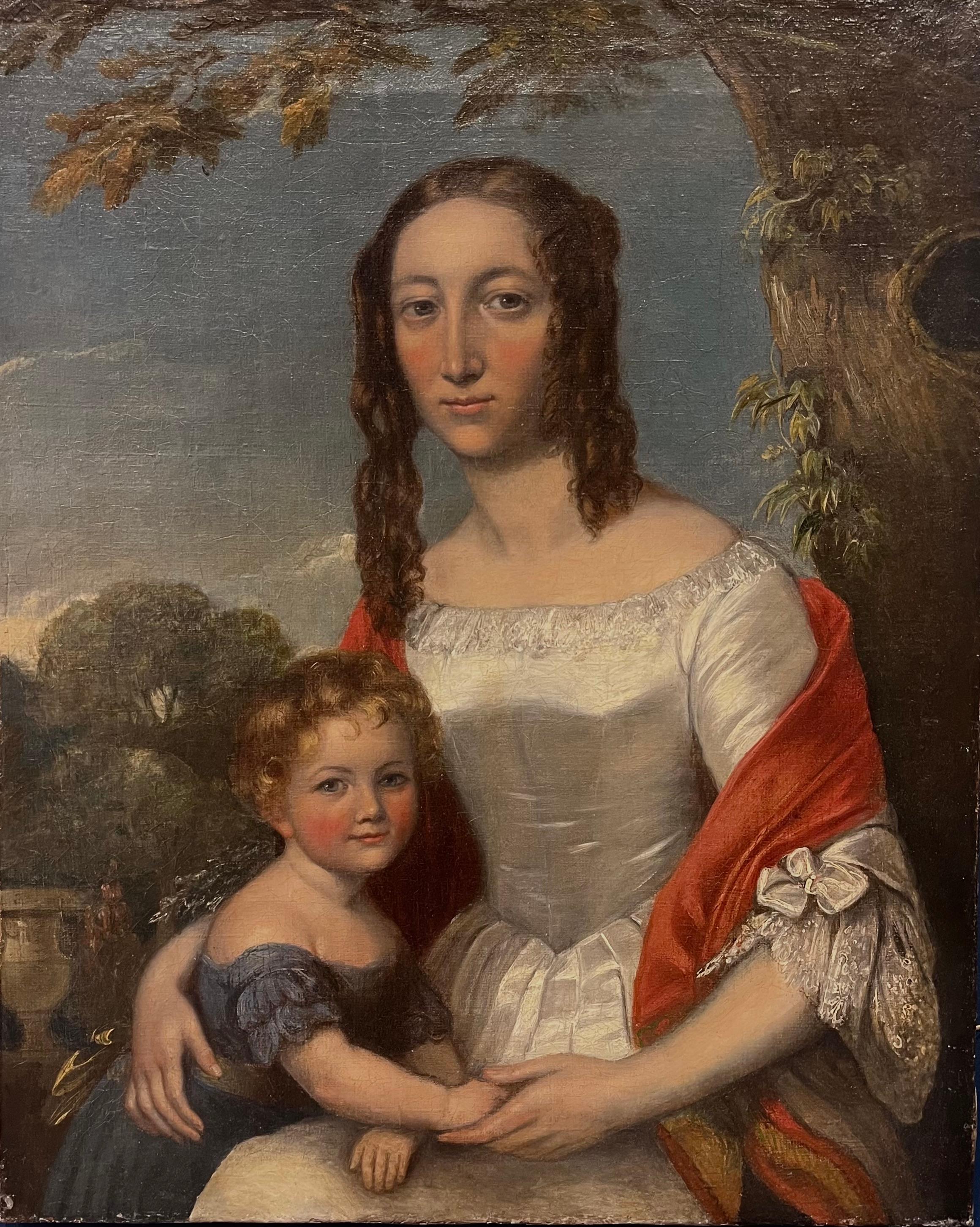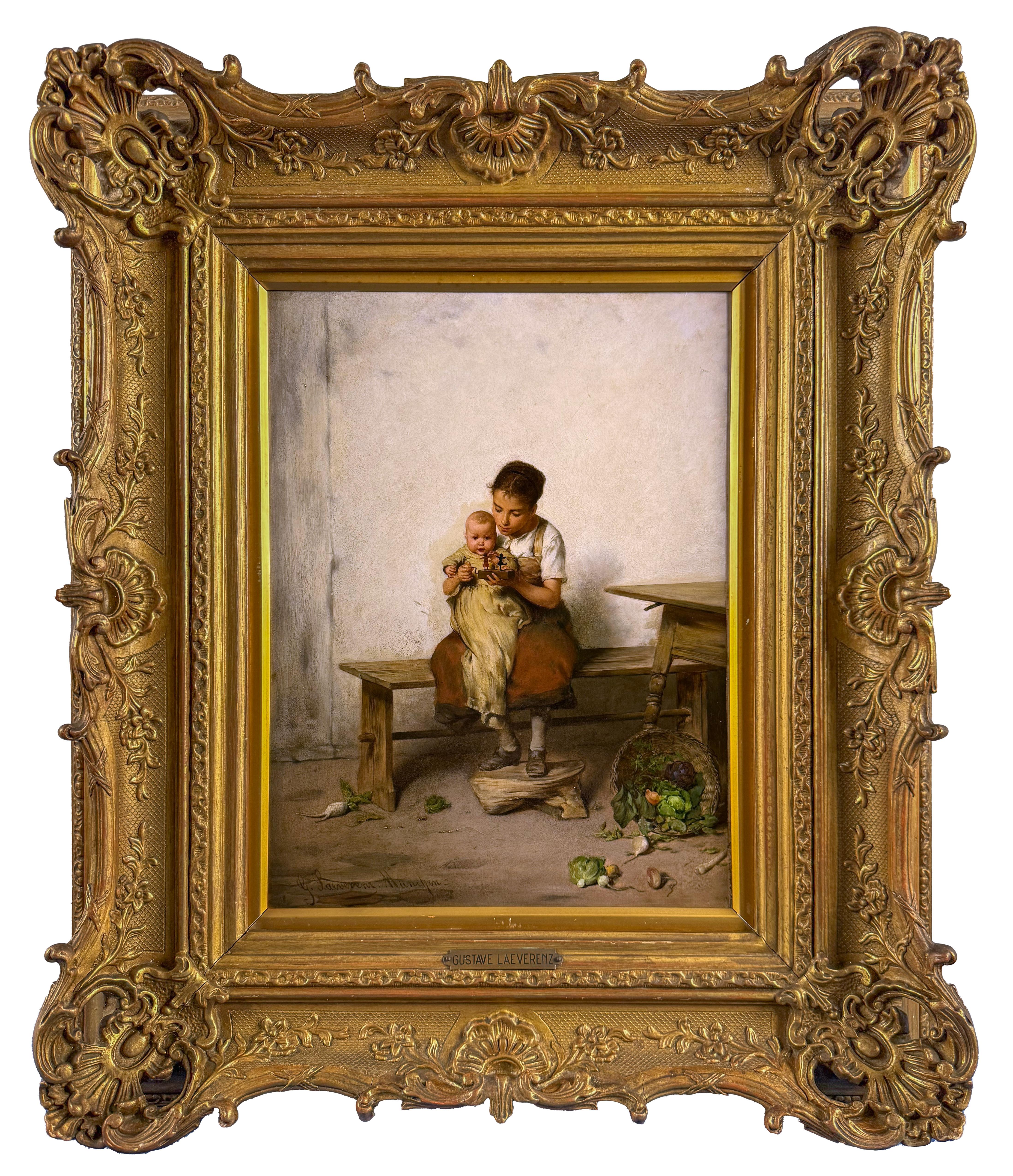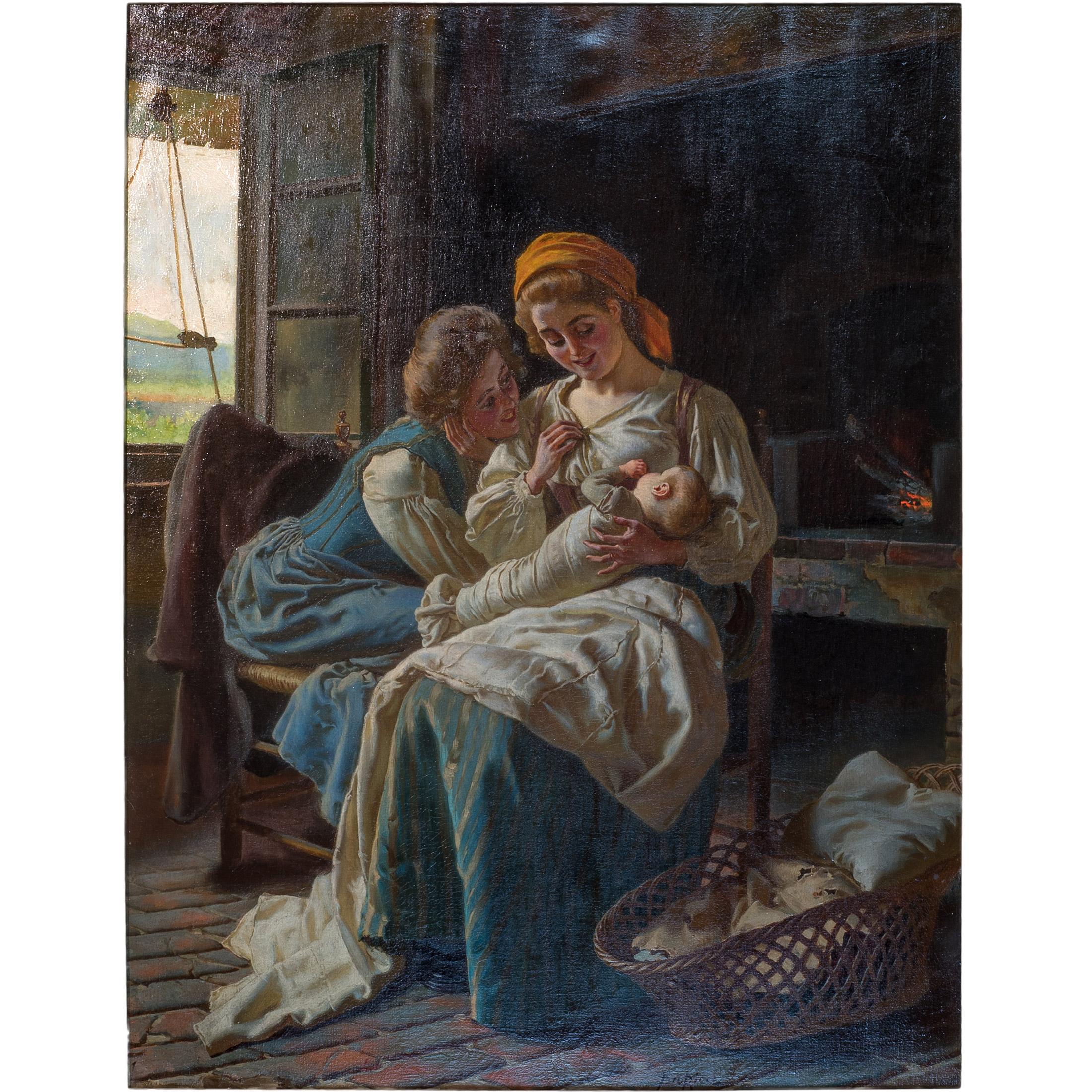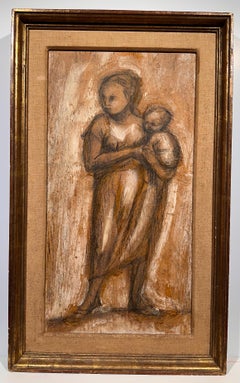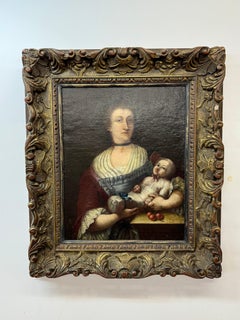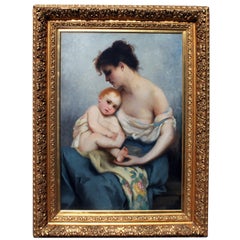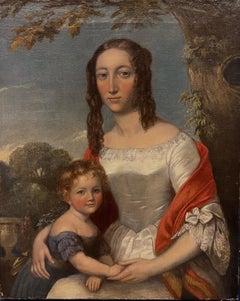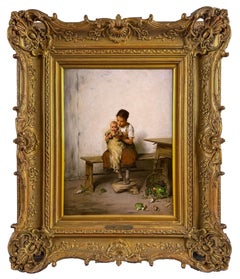Items Similar to Mother and Child
Want more images or videos?
Request additional images or videos from the seller
1 of 10
Alexandre de ValentiniMother and Child1842
1842
$960
$2,50061% Off
£732.96
£1,908.7461% Off
€846.92
€2,205.5361% Off
CA$1,347.66
CA$3,509.5361% Off
A$1,502.11
A$3,911.7361% Off
CHF 788.10
CHF 2,052.3561% Off
MX$18,343.16
MX$47,768.6461% Off
NOK 9,979.10
NOK 25,987.2461% Off
SEK 9,431.77
SEK 24,561.9061% Off
DKK 6,320.96
DKK 16,460.8461% Off
About the Item
Beautiful original painting by French artist, Alexandre de Valentini (1787-1887). Pencil and gouache on paper, 14 x 18.5 inches; 19 x 23.5 inches matted. Signed and dated with Paris as location. Paper is toned with age as is consistent with all Valentini examples. Vintage matting. Unframed.
- Creator:Alexandre de Valentini (1787 - 1887, French)
- Creation Year:1842
- Dimensions:Height: 23 in (58.42 cm)Width: 19 in (48.26 cm)
- Medium:
- Movement & Style:
- Period:
- Condition:
- Gallery Location:Wilton Manors, FL
- Reference Number:1stDibs: LU245210307602
About the Seller
4.9
Platinum Seller
Premium sellers with a 4.7+ rating and 24-hour response times
Established in 2007
1stDibs seller since 2015
414 sales on 1stDibs
Typical response time: 2 hours
- ShippingRetrieving quote...Shipping from: Wilton Manors, FL
- Return Policy
Authenticity Guarantee
In the unlikely event there’s an issue with an item’s authenticity, contact us within 1 year for a full refund. DetailsMoney-Back Guarantee
If your item is not as described, is damaged in transit, or does not arrive, contact us within 7 days for a full refund. Details24-Hour Cancellation
You have a 24-hour grace period in which to reconsider your purchase, with no questions asked.Vetted Professional Sellers
Our world-class sellers must adhere to strict standards for service and quality, maintaining the integrity of our listings.Price-Match Guarantee
If you find that a seller listed the same item for a lower price elsewhere, we’ll match it.Trusted Global Delivery
Our best-in-class carrier network provides specialized shipping options worldwide, including custom delivery.More From This Seller
View AllMother and Child
By Bruno Lucchesi
Located in Wilton Manors, FL
Bruno Lucchesi (b.1926). Mother and Child, ca. 1960. Oil and charcoal on sized paper mounted to masonite, measuring 11 x 21 inches; 15.5 x 25.5 inches in original gold leaf frame. Si...
Category
Mid-20th Century Abstract Figurative Paintings
Materials
Masonite, Paper, Oil
$560 Sale Price
20% Off
Portrait of Laurence Wedgwood (Pottery Company Director) as a Child.
Located in Wilton Manors, FL
Portrait of Laurence Wedgwood by unknown artist.
Pencil on paper, sheet measures 8 x 10 inches; 11 x 13 inches in ca. 1910 frame.
Foxing to sheet, no staining or loss. No conserva...
Category
Mid-19th Century Portrait Drawings and Watercolors
Materials
Pencil, Paper
Italian ca. 1960's Beautiful Young Woman Portrait
Located in Wilton Manors, FL
Portrait of a Beautiful Young Woman, ca. 1965.
Oil on linen canvas, 8 x 10 inches.
Framed measurement: 10.5 x 12.5 inches.
Signed indistinctly lower left.
Category
Mid-20th Century Modern Portrait Paintings
Materials
Canvas, Oil
The Rehearsal for Spontaneity
Located in Wilton Manors, FL
Artist Unknown
The Rehearsal for Spontaneity. 1990
Mixed Media on wood panel, 20 x 29.5 inches.
Unsigned and unattributed. Original label on verso. Frame has bee removed which e...
Category
1990s Figurative Paintings
Materials
Mixed Media, Wood Panel
Portrait of a Young Woman
Located in Wilton Manors, FL
Sylvia Bernstein (1918-1990). Portrait of a Young Woman, ca. 1960. Gouache on paper, image measures 9.5 inch h.., 10 inches w. ; 17 x 17 inches framed measurement. Signed lower right. Excellent condition.
Born : New York City
Education : National Academy of Design
Exhibits (group)
Juried Shows at : Allied Artists; Audubon Artists; National Society of Painters in Casein; Hudson River Museum; Butler Institute of American Art; Portland Summer Art Festival; Columbia Painting Biennial; Columbia Museum; Riverside Museum; Brick Store Museum; First National Exhibition of American Art, Chautauqua, New York; New York City Center; Pennsylvania Academy of Fine Arts; Philadelphia Watercolor Annual; Brooklyn Museum International Watercolor Exhibition; Art-USA; J & M Ringling Museum; 9th Annual American Watercolor Traveling Show; Whitney Museum of American Art; Parrish Museum; American Academy of Arts and Letters; Wadsworth Atheneum.
Solo Exhibits
1956 Ruth White Gallery; 1959 Ruth White Gallery; 1959 Silvermine Guild of Artists; 1960 Ruth White Gallery.
Awards :
National Association of Women Artists, 1954, 1957; New York City Center 1956; 1957 Honorable Mention National Arts Club, Allied Artists, Jane C. Stanley Memorial Award, Grumbacher Award in Watercolor at New England Painting...
Category
Mid-20th Century Abstract Abstract Paintings
Materials
Gouache
Portrait of the Artist's Daughter, Emily (Young Girl)
Located in Wilton Manors, FL
Josephine Wood Colby (1962-1930).
Portrait of the artist's Daughter, Emily. ca. 1900.
Oil on artist board, 8 x 12 inches; 13.5 x 15.5 inches in original oak frame.
Unsigned. Art...
Category
Early 1900s Academic Portrait Paintings
Materials
Oil
You May Also Like
Portrait of Mother and Child 19th century
Located in San Francisco, CA
Portrait of Mother and Child 19th century
Oil on canvas
Possibly German
16.5 x 21 unframed, 25 x 29 framed
No visible signature
Category
19th Century Figurative Paintings
Materials
Canvas, Oil
A Fine and Charming 19th Century Victorian Oil on Canvas "Mother and Child"
Located in LA, CA
Attributed to Charles Edward Hallé (British, 1846-1914) "Mother and Child" oil on canvas. The Victorian era artwork depicting a young mother holding her joyful infant child, within a...
Category
Late 19th Century Portrait Paintings
Materials
Oil
Oil on Canvas Portrait of Mother and Child
Located in Fredericksburg, VA
This painting is unsigned but evidence shows that it is from a European school. It shows a mother with a child on her lap as well as a forest background. Likely wealthier patrons due...
Category
Mid-19th Century English School Portrait Paintings
Materials
Canvas, Oil
Interior scene with a young mother and child
Located in New York, NY
Excellent condition. Signed G. Laeverenz München.
Category
19th Century Interior Paintings
Materials
Oil, Wood Panel
Fine Italian Painting of Mother and Child by Pio Ricci
Located in New York, NY
PIO RICCI
Italian, (1850-1919)
Adoration
Date: 19th century
Signature: Signed Pio Ricci (LR)
Medium: Oil on canvas
Dimension: 31 1/4 x 24 inches
Category
19th Century Portrait Paintings
Materials
Oil
Mother and Child
By Paul Alexandre Alfred Leroy
Located in New York, NY
A wonderful depiction of mother and child displayed in a gold round ornate frame with intricate details.
Category
Late 19th Century Realist Figurative Paintings
Materials
Canvas, Oil
More Ways To Browse
Mother And Child Paintings
Interior Painting 19 Century
Alexandre De Paris
Mid Century Mother And Child Art
19th Century Painting Mother And Child
Paintings Of Room Interiors
Duane Hanson
Empty Chair
Bedroom Interior Oil Painting
Le Chateau Interiors
Jonathan Louis
Outdoor Heart Sculpture
Picasso Dog
Duane Modern
Zurich Watches
P Mitchell
New Coke
Ralph Love Paintings
